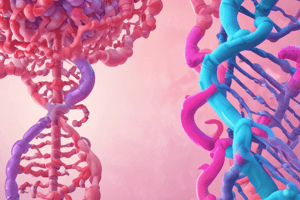Podcast
Questions and Answers
What type of mutation is involved in the conversion of a proto-oncogene to an oncogene?
What type of mutation is involved in the conversion of a proto-oncogene to an oncogene?
- Hypomorphic (loss of function)
- Neomorphic (new function)
- Hypermorphic (gain of function) (correct)
- Isomorphic (silent)
In hereditary retinoblastoma, where is the inherited mutation located?
In hereditary retinoblastoma, where is the inherited mutation located?
- RB1 TS gene on one copy of Chr 13q14 in all cells (correct)
- RB1 TS gene on one copy of Chr 13q14 in retinal cells
- RB1 TS gene on both copies of Chr 13q14 in retinal cells
- RB1 TS gene on both copies of Chr 13q14 in all cells
What is the classic example of a hereditary cancer syndrome related to the 'first hit' in a TSG being inherited as a constitutional mutation?
What is the classic example of a hereditary cancer syndrome related to the 'first hit' in a TSG being inherited as a constitutional mutation?
- Hereditary Retinoblastoma (correct)
- Hereditary Colon Cancer
- Hereditary Breast Cancer
- Hereditary Lung Cancer
What is the percentage of cases in which sporadic retinoblastoma accounts for the two hits occurring de novo (somatic)?
What is the percentage of cases in which sporadic retinoblastoma accounts for the two hits occurring de novo (somatic)?
What is the most common mechanism for the '2nd hit' to occur in familial cancer syndromes?
What is the most common mechanism for the '2nd hit' to occur in familial cancer syndromes?
Which gene mutations are most common in hereditary breast cancer?
Which gene mutations are most common in hereditary breast cancer?
What type of inheritance pattern is observed in hereditary/familial cancer syndromes?
What type of inheritance pattern is observed in hereditary/familial cancer syndromes?
What is the potential of molecular (gene expression) profiling in cancer management?
What is the potential of molecular (gene expression) profiling in cancer management?
What did a 2018 study find about the mean total cost of NGS for targeted gene panels in clinical practice in France?
What did a 2018 study find about the mean total cost of NGS for targeted gene panels in clinical practice in France?
What did a 2018 meta-analysis find about WGS/WES in diagnosing genetic abnormalities in children?
What did a 2018 meta-analysis find about WGS/WES in diagnosing genetic abnormalities in children?
What is the potential of cancer genomics and NGS technologies in clinical practice?
What is the potential of cancer genomics and NGS technologies in clinical practice?
What is the main issue to be overcome for the clinical practice of cancer genomics and NGS technologies?
What is the main issue to be overcome for the clinical practice of cancer genomics and NGS technologies?
Which mechanism is the most important for the second hit in hereditary cancer syndromes?
Which mechanism is the most important for the second hit in hereditary cancer syndromes?
What percentage of Retinoblastoma cases have a positive family history?
What percentage of Retinoblastoma cases have a positive family history?
Which type of inheritance pattern is associated with hereditary cancer syndromes?
Which type of inheritance pattern is associated with hereditary cancer syndromes?
What percentage of breast cancer cases is accounted for by Hereditary Breast Cancer (HBC)?
What percentage of breast cancer cases is accounted for by Hereditary Breast Cancer (HBC)?
Which gene is a tumor suppressor gene with a germ-line inherited non-functioning allele?
Which gene is a tumor suppressor gene with a germ-line inherited non-functioning allele?
What drives breast cancer as a genetic disease?
What drives breast cancer as a genetic disease?
What is the most significant factor contributing to cancer progression?
What is the most significant factor contributing to cancer progression?
What are the challenges of Next Generation Sequencing (NGS) in clinical medicine and public health?
What are the challenges of Next Generation Sequencing (NGS) in clinical medicine and public health?
Which syndrome is an example of a hereditary cancer syndrome?
Which syndrome is an example of a hereditary cancer syndrome?
Which type of mutation increases the likelihood of both copies being affected?
Which type of mutation increases the likelihood of both copies being affected?
What is the risk of other forms of cancer in hereditary cancer syndrome patients?
What is the risk of other forms of cancer in hereditary cancer syndrome patients?
Which gene is associated with a 95% risk of Retinoblastoma?
Which gene is associated with a 95% risk of Retinoblastoma?
Flashcards are hidden until you start studying
Study Notes
Hereditary Cancer Syndromes and Breast Cancer
- Inherited mutations increase the likelihood of both copies being affected
- Loss of Heterozygosity (LOH) is the most important mechanism of the second hit in hereditary cancer syndromes
- Retinoblastoma has a 95% risk, and only 10% of cases have a positive family history
- Hereditary cancer syndrome patients are prone to other forms of cancer
- Familial Adenomatous Polyposis (FAP) and Lynch Syndrome are examples of hereditary cancer syndromes
- Hereditary cancer syndromes are inherited in an autosomal dominant pattern
- Hereditary Breast Cancer (HBC) accounts for about 5% of breast cancer cases
- BRCA1 is a tumor suppressor gene with germ-line inherited non-functioning allele
- Breast cancer is a genetic disease driven by DNA changes in somatic cells
- Cancer progression is the result of the accumulation of several genetic and chromosomal changes
- Different cancers are associated with specific oncogenes or tumor suppressor genes
- Challenges of Next Generation Sequencing (NGS) in clinical medicine and public health include data analysis, informed consent, data protection, and costs.
Studying That Suits You
Use AI to generate personalized quizzes and flashcards to suit your learning preferences.



